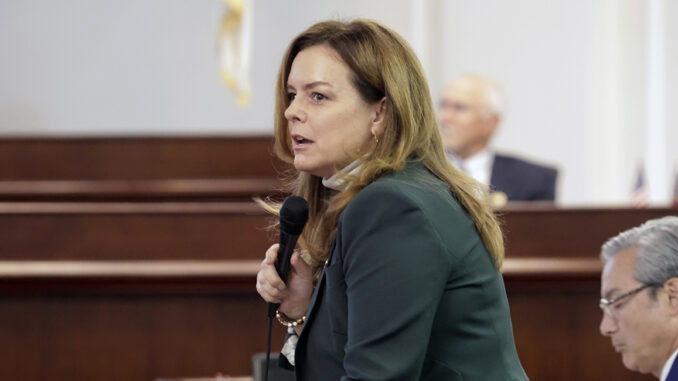
RALEIGH — A bill filed in the North Carolina Senate seeks to define biological sex in statute while limiting certain spaces to be separate by that definition.
Senate Bill 516, filed by Sen. Vicki Sawyer (R-Iredell), would standardize and define terms related to biological sex, gender and related concepts across state statutes.
The bill defines biological sex based on reproductive characteristics present at birth, stating that “psychological, chosen, or subjective experience of gender” is not considered in these definitions.
The legislation also establishes rules for sex-based separation in various public facilities, including prisons, schools, domestic violence centers and restrooms.
Key provisions related to facilities include requiring single and multiple occupancy restrooms, changing facilities and sleeping quarters can only be used by individuals of the designated biological sex at a time.
Under the bill, public schools are prohibited from allowing students of different biological sexes to share sleeping quarters, with exceptions made for family members, medical assistance, law enforcement and other emergency situations.
The bill includes a legal framework for enforcement, allowing individuals to file civil actions against facilities that fail to enforce sex-based separation rules. Potential remedies include injunctive relief, actual damages, attorneys’ fees and punitive damages.
Additionally, the bill modifies birth certificate and driver’s license regulations, requiring those documents to reflect biological sex as defined in the bill.
Sawyer’s bill aligns with an executive order issued by President Donald Trump in January.
In Trump’s order, sex “shall refer to an individual’s immutable biological classification as either male or female.” The order also says sex is “not a synonym for and does not include the concept of ‘gender identity.’”
North Carolina Democratic Party Chair Anderson Clayton issued a statement accusing General Assembly Republicans of bringing back “this decade’s version of the infamous ‘bathroom bill,” also known as House Bill 2 (H.B. 2).
“The title of the bill is ‘Women’s Safety and Protection Act’ and that pisses me off,” said Clayton before listing items to protect women like addressing maternal mortality rates, sexual violence, gun restrictions for domestic abusers and equal pay issues.
In an X post that followed, Clayton cursed at lawmakers, stating in part, “I say this with my full chest, f— the Republican legislators who would rather attack communities than do their jobs and protect them.”
Sawyer acknowledged the H.B. 2 references being made and issued a statement to North State Journal.
“This bill is about protecting women’s privacy and safety in places where they are most vulnerable — like domestic violence shelters, school trips, and correctional facilities,” said Sawyer.
“It’s a commonsense measure to ensure that biological sex is respected in the law and that women aren’t forced to surrender their right to secure, private spaces,” Sawyer said. “This is not a repeat of HB2 — it’s a focused, reasonable step to protect North Carolina women and girls.”
H.B. 2 was passed in response to an ordinance by the Charlotte City Council that opened access to bathrooms, locker rooms and other spaces regardless of biological sex. The bill rolled back that ordinance, restoring state and local decency laws that had existed for decades.
Protests and boycotts followed in North Carolina — including the 2017 NBA All-Star Game being moved to New Orleans. Charlotte hosted the event two years later, in 2019.
An important part of the Charlotte ordinance was that it applied not only to public and government-funded spaces but also to private businesses. In contrast, Sawyer’s bill only covers public facilities.
Former Gov. Roy Cooper — who had used the controversy to defeat Republican incumbent Pat McCrory — signed House Bill 142 into law in 2017, effectively resetting the law enacted by H.B. 2. Among the provisions of the 2017 law was a prohibition on municipalities from enacting similar ordinances for two years that ended in December 2020.
“Polls show that in the past few years people have woken up to the reality that women and girls are harmed when men and boys are allowed in their private spaces,” conservative nonprofit NC Values said in a statement to North State Journal in support of Sawyer’s bill. “Parents do not want their daughters forced to share a bedroom with boys on field trips — and yet this is the policy of four NC school districts.
“President Trump’s Executive order and a growing number of state laws now designate private spaces by biological sex and define male and female by biology. Because of these political and cultural changes, including the recent rollbacks of DEI programs in corporate America, we do not expect this bill will receive the same blowback that HB2 did.”


